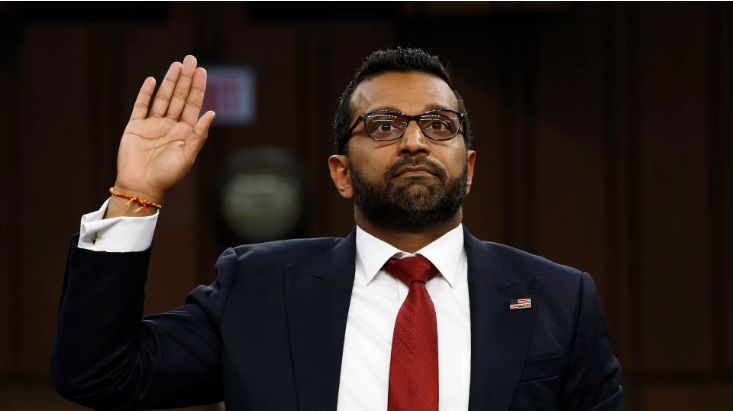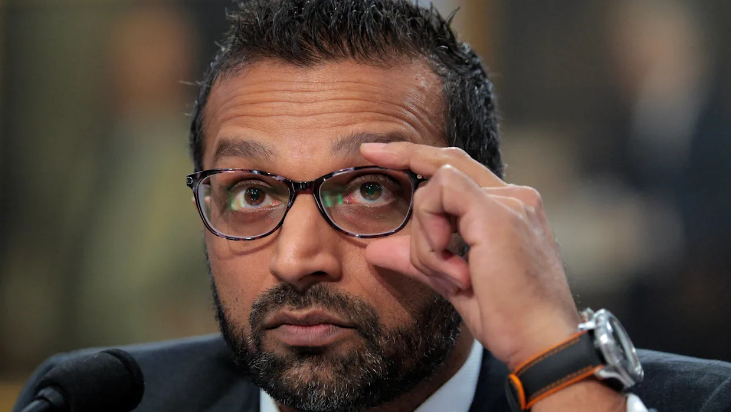In a political moment that could shake Washington to its core, Trump administration official Kash Patel has launched a blistering attack against Rep. Ilhan Omar (D-MN), accusing her of serious financial and national security misconduct. Patel, a former chief of staff to the Acting Secretary of Defense and a senior intelligence adviser under Trump, has stirred up political firestorms with allegations that, if proven true, could have devastating consequences for Omar’s career and her standing in Congress.
The accusations are layered and complex, touching on two critical areas: alleged immigration fraud and potential links to the leak of classified U.S. government information.
While these charges have fueled partisan debates, they also raise uncomfortable questions about political accountability, the influence of former government officials, and the intersection of national security and personal reputation.
Patel’s first major claim relates to an accusation that has dogged Omar for years: the alleged use of a fraudulent marriage to facilitate the immigration of her biological brother to the United States.
This allegation, which has been widely dismissed by Omar and her supporters as a “racist smear,” has lingered in conservative circles, but Patel framed it as a legitimate question about unresolved inconsistencies in Omar’s immigration paperwork.
In a televised interview, Patel argued that the matter should not be dismissed as a partisan attack. “The American people have been told to dismiss this as a baseless attack,” Patel said, “But if you or I had even a fraction of these irregularities in our immigration paperwork, Homeland Security would have been knocking on our door years ago. There’s a double standard here — and it’s corrosive to the rule of law.”
Though Patel stopped short of releasing any hard evidence, he hinted at documents—some reportedly internal government records—that could support his claims.

He teased that these files would eventually be made public, suggesting that his allegations had a factual basis that went beyond mere conjecture. This added a layer of intrigue and uncertainty to the controversy, with political observers speculating about the true weight of the evidence Patel may be preparing to release.
The timing of Patel’s accusations is especially significant, given that Omar is facing re-election in a year when political outsiders are aggressively targeting incumbents.
By revisiting the immigration fraud claim, Patel effectively revived a longstanding political controversy, amplifying its potential impact at a crucial moment in Omar’s political career.
While the immigration fraud claim was explosive enough, it was Patel’s second charge that truly rattled Washington: the suggestion that Omar may have been involved in leaking classified U.S. government information to foreign actors.
According to Patel, Omar, as a member of key congressional committees, had access to sensitive intelligence briefings, and classified material from these briefings may have been intentionally or unintentionally shared with foreign officials.
Patel carefully avoided directly accusing Omar of espionage but used language that raised alarms across the intelligence community. “Foreign intelligence-linked intermediaries,” “information exfiltration,” and “friendly overseas intelligence services” were all terms Patel used that immediately sparked concerns about national security breaches.
Even though Patel stopped short of definitively calling Omar a spy, the insinuation was clear: she may have compromised sensitive national security information.
If such allegations were ever substantiated, the political and legal consequences for Omar would be catastrophic. Leaking classified information is a serious federal offense that can result in criminal charges under the Espionage Act, and could lead to prosecution, conviction, and jail time.

Patel’s remarks have already prompted investigations within certain oversight committees, and the potential for further probes is real. National security experts warned that these accusations, even without evidence, could spark intense scrutiny of Omar’s role in government.
Patel’s claims that “foreign intelligence partners” had flagged “concerning patterns of communication” involving Omar added further fuel to the fire. While these allegations are still unproven, they have sent shockwaves through Washington, especially given the sensitive nature of classified information and the high stakes involved.
The mere suggestion that a sitting member of Congress might have mishandled or leaked such information is a nightmare scenario for the U.S. intelligence community.
The allegations caught Ilhan Omar and her office off guard, prompting a swift, albeit measured, response. Within hours of Patel’s interview, Omar’s communications team released a brief statement dismissing the claims as politically motivated.
“Kash Patel is a disgraced, partisan operative attempting to stay relevant by recycling discredited lies. This is not journalism, it’s political theater,” the statement read.
While Omar directly addressed the immigration fraud allegations, dismissing them as part of a racist smear campaign, she was noticeably silent on the more explosive allegations regarding classified leaks.
Her allies suggest this silence was a calculated decision: responding in detail to such a serious national security claim would only lend it credibility. Instead, Omar’s camp appears to be taking the stance that the accusations are so baseless and absurd that they do not warrant a detailed rebuttal.
However, in the current media environment, where silence can often be interpreted as guilt, this lack of a direct response has raised eyebrows. Political strategists argue that while Omar may be right to avoid dignifying such allegations, her silence on the matter only fuels public suspicion, especially given the gravity of the claims Patel made.

The timing of Patel’s media blitz is anything but coincidental. Ilhan Omar has long been a vocal critic of U.S. foreign policy, particularly in the Middle East and Africa, and has frequently clashed with members of both parties over issues like military aid, intelligence sharing, and counterterrorism strategies.
Patel, who served in an administration openly hostile to Omar’s policy positions, knows how to frame an accusation that resonates with voters concerned about loyalty, patriotism, and national security.
By coupling the old immigration fraud allegations with the new accusations of classified leaks, Patel has created a potent two-pronged narrative: Omar is not just dishonest about her past, but she could also be a present danger to U.S. national security.
In today’s political climate, these kinds of accusations are especially powerful, even without any formal proof. They feed into existing narratives about distrust of politicians, particularly those seen as divisive figures in the eyes of the conservative electorate.
This strategic timing — with a re-election campaign looming and Republicans in desperate need of a powerful opponent to target — indicates that Patel’s goal is not just to expose alleged wrongdoing but to severely damage Omar’s political future.
Whether the allegations have merit is one thing; whether they can be used effectively to harm Omar’s standing in the next election is another matter entirely.
If Patel’s allegations gain traction, they could trigger an official investigation by the House Ethics Committee or even a referral to the Department of Justice for further action.
Such a probe would inevitably dominate the news cycle for weeks, if not months, drawing further attention to Omar’s personal and political conduct rather than her legislative achievements or policy stances.

For Washington as a whole, the stakes are even higher. This episode underscores the increasingly fraught relationship between national security, political influence, and the use of personal accusations to shape public opinion.
As the public becomes more accustomed to scandals involving elected officials, the trust in those who hold office erodes — making it harder for any politician to maintain their credibility once they are caught in a crossfire of accusations.
Moreover, this situation highlights the weaponization of intelligence-related accusations in modern politics. In a time when information leaks, foreign interference, and national security breaches dominate the headlines, accusations like Patel’s can carry outsized weight, regardless of whether they are ever proven in a court of law.
At present, Omar remains in her position, with her supporters rallying to her defense and her opponents using the allegations to paint her as a liability. Patel, for his part, has made it clear that this is just the beginning.
He has suggested that more revelations will follow, and whether those revelations prove to be substantial or not, the damage to Omar’s reputation has already begun.
In Washington, allegations can often become as potent as actual convictions. Omar’s political future may be irrevocably altered by these accusations, whether or not they are substantiated. In a landscape where perception often matters more than proof, the battle over her legacy may already be lost — at least in the court of public opinion.
As the investigation and media storm unfold, one thing is certain: the future of Ilhan Omar’s political career has just become much more uncertain.